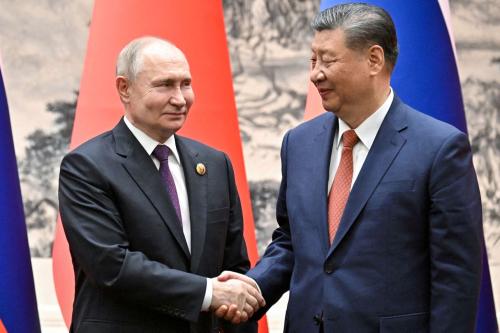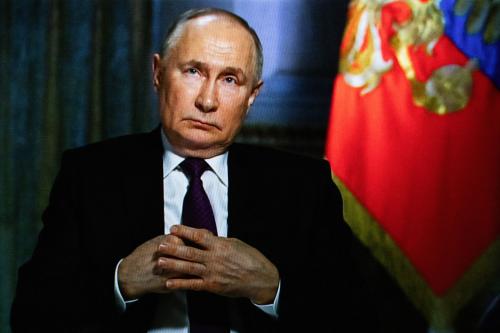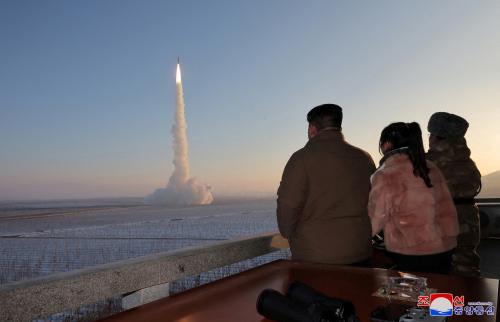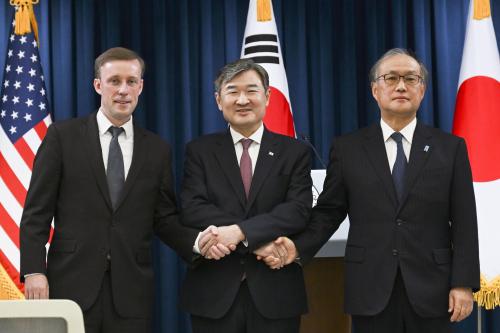The newly inked Russia-North Korea security pact has spiked anxiety around the world about Russian President Vladimir Putin and North Korean leader Kim Jong Un’s growing partnership and its implications for the Korean Peninsula, Ukraine, and beyond. While some have pointed to the past week’s developments as more evidence of a hardening “alignment of evil” that includes Russia, North Korea, China, and Iran, the reality is that the pact might do more to fracture than solidify any burgeoning axis.
With regional tensions rising, history could very well repeat itself: China could be drawn into a crisis or even a full-blown war on the Korean Peninsula that it has no interest in fighting, be left to clean up the mess given Moscow’s preoccupation in Europe, and suffer major setbacks to its actual priorities as a result.
China’s top objectives for the Korean Peninsula—no crisis or chaos—are actually more in line with the interests of Washington and its allies than with Pyongyang and Moscow. Before a crisis strikes, the United States and China, along with South Korea and other regional stakeholders, should work together to rein in the Putin-Kim collaboration and revamp diplomacy on the Korean Peninsula.
North Korea emboldened
The newly signed Russia-North Korea security pact is deliberately ambiguous by design. The text states that the two sides will provide “military and other assistance with all means in its possession without delay” if one party falls into a “state of war” due to an “armed invasion” by one or more countries. This raises the question of what counts as a “state of war” and the threshold that would need to be met for the mutual security clause to be triggered. Furthermore, the type of support to be rendered by either party is left quite open—“military and other assistance” could refer to anything from intelligence sharing to sending troops on the ground.
This ambiguity is likely intended to keep the United States and its allies uncertain about what might trigger the mutual defense clause and to instill caution as a result. And the vague wording on the types of assistance also gives Pyongyang and Moscow flexibility in their obligations to one another. It’s also quite possible that Moscow and Pyongyang have different interpretations and expectations of what they’ve promised each other.
Nevertheless, a grave concern is that with a Russian “security guarantee” or at least the facade of one in hand, North Korea may be emboldened to intensify its provocations based on the calculation that the United States and its allies will respond with greater caution now that they have to take a potential Russian reaction into account.
Putin unlikely to restrain Kim
Even more concerning is that Moscow has little incentive to restrain its junior partner from engaging in actions that destabilize Northeast Asia. In fact, Putin could very well welcome a North Korean provocation on the Korean Peninsula that forces the United States to turn its attention away from Europe, where Russia is continuing its relentless war against Ukraine.
It’s also conceivable that Russia and North Korea—both of whom have much to gain from another Trump presidency—might initiate an “October surprise” in an attempt to tilt the U.S. presidential elections in Trump’s favor. After all, the former president has openly expressed fondness for both Kim and Putin. Trump has also suggested that he would strike a deal with Pyongyang that allows it to keep its nuclear weapons and that he would cut U.S. aid to Ukraine immediately upon election.
Chinese, Russian, and North Korean interests diverge
These developments have rattled not just the United States and its allies, but also China. Beijing is rapidly losing its influence with Pyongyang relative to Moscow, all the while paying the diplomatic costs of being associated with the two pariah states.
To be sure, Beijing, Moscow, and Pyongyang share deep grievances about what they see as a U.S.-dominated global order. All three seek to erode Washington’s power and influence. But a key difference between Beijing and its two partners is that it seeks to achieve such an end without setting the world on fire or completely derailing its profitable ties with the world’s developed countries.
China needs a stable environment to deal with its myriad economic challenges at home and to manage trade tensions and de-risking efforts by Western states. China wants to move up the technology and innovation ladder and accelerate its military modernization, which Beijing believes is essential for compelling unification with Taiwan. In contrast, neither Russia nor North Korea has promising economic prospects or believes it benefits from a stable global order. This is why both countries have exclusively embraced violently disrupting the status quo.
In private conversations, Chinese observers, like their South Korean and American counterparts, express concerns about their lack of visibility on the military technology transfers being made between Russia and North Korea and the short- to long-term consequences of such transfers. They also share fears that Putin may be encouraging Kim to take destabilizing actions to distract the United States, raising the risk of war on China’s doorstep.
The last thing Beijing wants is U.S. attention shifted from Europe to Asia. Beijing is already uncomfortable and incensed by enhanced nuclear coordination between the United States and the Republic of Korea (ROK), deepening U.S.-ROK-Japan trilateral cooperation, and the many other steps the Biden administration has taken to strengthen alliance cooperation and deterrence in the region.
China left holding the bag?
China may soon find itself paying the costs of North Korean adventurism like it did at the beginning of the Cold War when the newly established People’s Republic of China (PRC), encouraged by Moscow to advance the communist cause in Asia, agreed to support the North Korean regime next door. Kim Il Sung, Kim Jong Un’s grandfather, gladly took advantage of Soviet and Chinese backing to pursue his ambitions of absorbing the entire Korean Peninsula. He kicked off the first hot conflict of the Cold War which led to the death of an estimated five million civilians and soldiers, including hundreds of thousands of Chinese troops.
This was at a time when the Chinese communists faced the urgent task of consolidating their rule at home and rebuilding China’s war-torn economy. Instead, they were forced to pivot their attention to the Korean Peninsula and direct almost half of their state budget to military spending. Mao Zedong also lost an opportunity to invade Taiwan—a goal that continues to elude Beijing today—after the United States sent the 7th Fleet to neutralize the Taiwan Strait.
To add insult to injury, the Chinese counted on Soviet air cover and weapons as part of their agreement with Moscow to help the North Koreans. But Josef Stalin waffled on his commitments at critical moments and the burden of assisting the North Koreans fell heavily on Beijing’s shoulders.
While the PRC then is not the same as the PRC today, and the power dynamics among all of the states have shifted, Russian and North Korean collusion has never played out favorably for China.
The case for U.S.-China coordination
The United States, China, ROK, Japan, and virtually every other state in the region seeks stability, peace, and the ultimate elimination of the threat posed by North Korea’s nuclear and missile programs. There’s a strong case for collaboration before the Russian-North Korean partnership takes the region further away from these objectives.
The world is facing conflicts in Europe and the Middle East. The fact that Washington and Beijing have not been able to work together on these conflicts and are often at cross-purposes raises the question of how one might expect U.S.-China cooperation on the Korean Peninsula.
Yet the brewing crisis in Northeast Asia is different: there’s so much more at stake for China’s direct security interests, as well as those of the United States and its closest Asian allies. Perhaps most disturbing for Beijing is that while it may be able to control escalation dynamics in the Taiwan Strait or in the South China Sea as a direct party in the conflicts, it can’t say the same for Russian-backed North Korean adventurism.
Enhanced U.S.-ROK-Japan military deterrence is necessary but insufficient to meet the growing challenge posed by Russia and North Korea’s alignment. It will also take clear and credible threats and assurances from the United States and China to shape Pyongyang and Moscow’s behavior. Collaboration doesn’t suggest that all steps, if any, need to be taken jointly. After all, Washington and Beijing have different relationships and points of leverage with North Korea and Russia. But quiet discussions on how the two sides might signal redlines and revamp a dead diplomatic process that neutralizes the threat posed by North Korea are in urgent order.






Commentary
Putin and Kim are creating a crisis—Can the US and China rein them in?
Russian and North Korean collusion has never played out favorably for China.
June 21, 2024